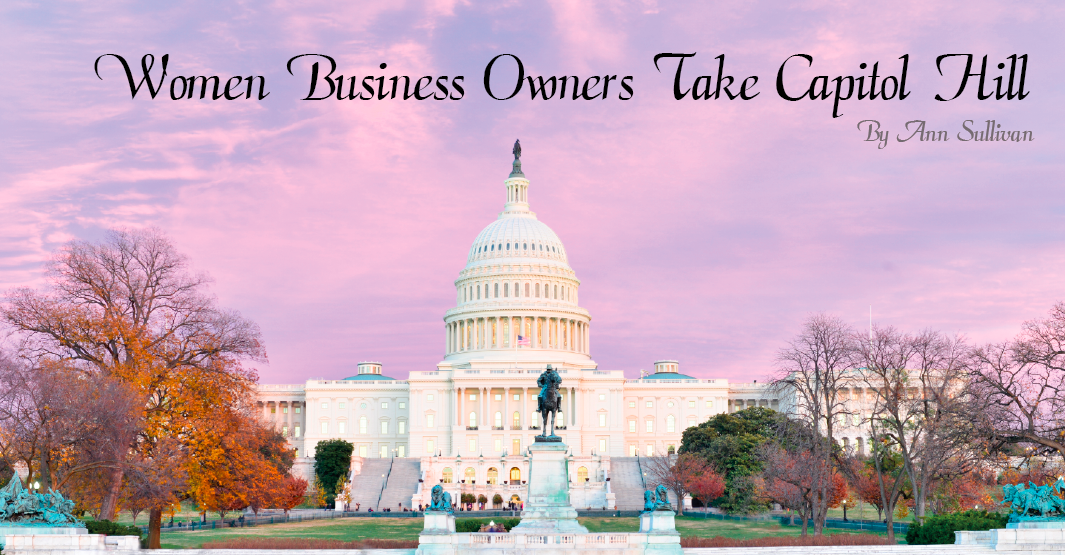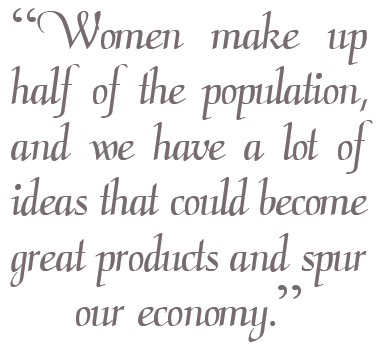
Advocating for change, more than 300 women business owners and their leaders descended on Washington, D.C. packing one of the largest Congressional hearing rooms on Capitol Hill to standing room only. Congressional hearings rarely draw this kind of attendance or celebrity, but both were on display for a July 23, 2014 hearing, “Empowering Women Entrepreneurs: Understanding Successes, Addressing Persistent Challenges, and Identifying New Opportunities,” chaired by newly appointed Committee Chair Maria Cantwell (D-WA).
The hearing, which coincided with the annual conferences of Women Impacting Public Policy (WIPP) and the Association of Women’s Business Centers (AWBC), featured witness testimony from Maria Contreras-Sweet, Administrator of the Small Business Administration, Barbara Corcoran, host of the hit ABC TV series “Shark Tank,” Nely Galán and women entrepreneurs who spoke of their experiences – both the successes and the struggles – of starting and growing businesses. The hearing was broken into three separate sessions: access to capital, access to federal contracts, and access to counseling and training.
The takeaway was simple: there are federal policies that can help women business owners in each of the three areas and the Congress should act on them immediately. The reaction from the Senate was swift; one week after the hearing, Committee Chair Cantwell and six of her Senate colleagues introduced legislation, appropriately titled the Women’s Small Business Ownership Act of 2014, S.2693.
“Women make up half of the population, and we have a lot of ideas that could become great products and spur our economy,” said Chair Cantwell at the bill’s introduction, adding, “This legislation will help ensure women entrepreneurs get the right tools they need to turn those ideas into new businesses and create jobs.”
The Senate bill was largely founded on a report released by the Committee in July, 21st Century Barriers to Women’s Entrepreneurship. The findings are summarized neatly – yet alarmingly – into two short sentences: “In the 21st Century, women entrepreneurs still face a glass ceiling; while women-owned firmsare the fastestgrowing segment of businesses, and many succeed, women must overcome barriers their male counterparts do not face.” The report highlights the fact that women businesses generate $3 trillion in economic activity and support more than 23 million jobs, but continue to face significant obstacles when it comes to business ownership.
 More specifically, the Senate report identified critical challenges women confront in three issue areas: access to capital, access to business training and counseling, and access to the federal marketplace. According to the report, women entrepreneurs account for just $1 out of every $23 in small business lending in the United States, despite representing 30 percent of all small companies. Women’s Business Centers (WBCs) provide entrepreneurial and business training to women entrepreneurs (which they do efficiently and effectively at a cost of approximately $137 per entrepreneur) but are stretched extremely thin with most states having just one center with a small staff.Despite a 500 billion dollar a year federal marketplace, women-owned small businesses got only 4.3 percent of federal contracts in FY2013, despite a Congressionally mandated goal of five percent.
More specifically, the Senate report identified critical challenges women confront in three issue areas: access to capital, access to business training and counseling, and access to the federal marketplace. According to the report, women entrepreneurs account for just $1 out of every $23 in small business lending in the United States, despite representing 30 percent of all small companies. Women’s Business Centers (WBCs) provide entrepreneurial and business training to women entrepreneurs (which they do efficiently and effectively at a cost of approximately $137 per entrepreneur) but are stretched extremely thin with most states having just one center with a small staff.Despite a 500 billion dollar a year federal marketplace, women-owned small businesses got only 4.3 percent of federal contracts in FY2013, despite a Congressionally mandated goal of five percent.
In order to lift the glass ceiling for women business owners, the legislation proposes specific actions, which are described in greater depth below:
Access to Capital
The bill enhances the SBA’s Microloan program by allowing lenders in the program to increase overall lending capacity to $7 million and by offering more flexible loan terms, and improved business counseling and technical assistance. This legislation also makes the SBA Intermediary Lending Program permanent and would extend for one more year the fee waiver on 7(a) business loans below $150,000. Together, these changes would allow for greater access to capital for women-owned businesses. If you do not know about these lending programs, go to the Small Business Administration’s website.
Access to Counseling and Training
To boost support and modernize the national network of Women’s Business Centers, the bill increases funding of the program from $14.5 million per year to $26.75 million and increases the maximum grant award from $150,000 to $250,000. The bill also requires that a formal set of program guidelines be issued and reinstates the SBA’s authority to waive the federal matching requirement.
Access to Federal Contracting
Finally, the legislation would provide sole source authority in the Women-Owned Small Business (WOSB) Procurement Program. Currently, government agencies must find multiple women-owned small businesses capable of competing for a contract before the WOSB program can be used. Sole source authority removes this burden, making it easier for agencies to award contracts to women through the program. It is also a matter of fairness, as the WOSB is the only government small business contracting program that does not have sole-source authority.
These policies are important and advocates such as WIPP, the AWBC, and the Association for Enterprise Opportunity (AEO), are working hard to see them signed into law.
The sheer number and awe-inspiring presence of so many women – who traveled from all over the country – to unite in support of a common cause was powerful. The hearing room, more typically accustomed to hushed tones and wonky exchanges, was packed to the brim with successful women business owners ready to act.
While organizations dedicated to assisting women business owners will press for enactment, it is the push from each woman business owner in the country that will make the difference.
Together, we can break through the glass ceiling that now limits women businesses from reaching their full potential.
—

Ann Sullivan
WIPP Government
Relations

 Login
Login
